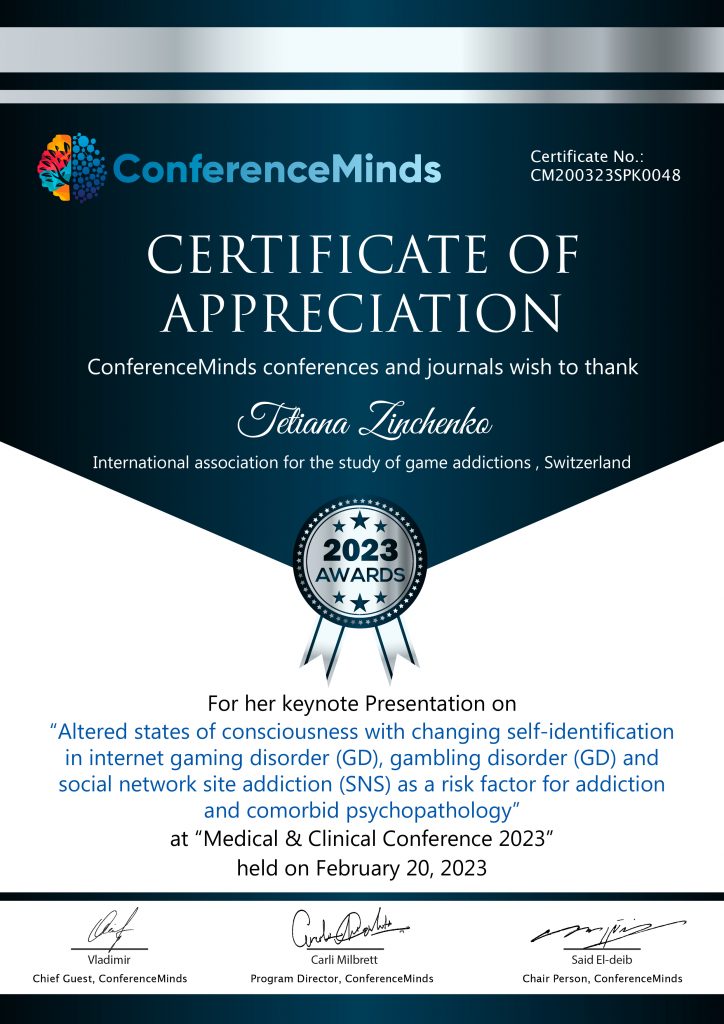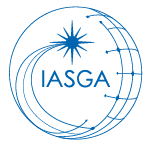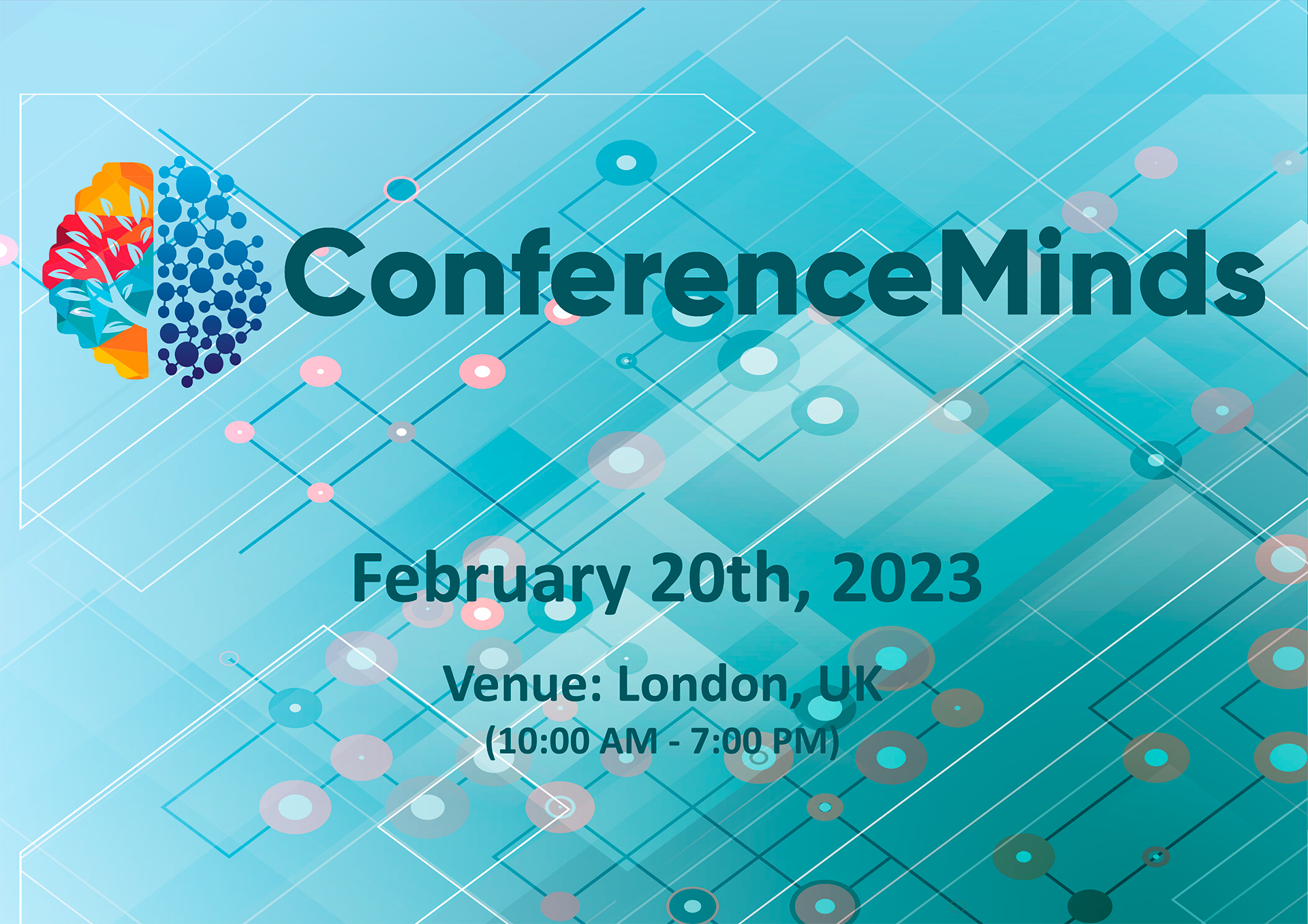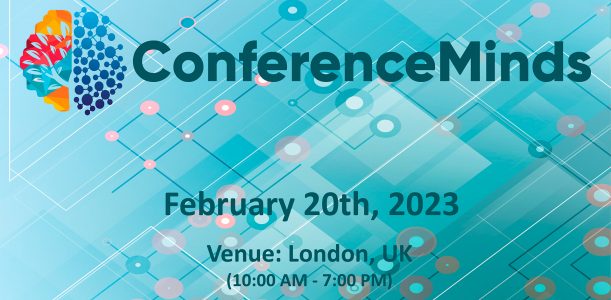The members of International Association for the Study of Game Addictions (IASGA) presented shocking results of their years of research into altered states of consciousness in addicted gamers and problematic social media users to colleagues from different countries at “Medical & Clinical Conference 2023”was held on February 20, 2023, London, UK.
The research was prepared for presentation and publication by president of the Association Tetiana Zinchenko and Manal Lamouinein, who specialise in cognitive neuropsychology at the University of Sidi Mohammed Ben Abdellah-Fez, Morocco.
Presentation title: “Altered states of consciousness with changing self-identification in internet gaming disorder (GD), gambling disorder (GD) and social network site addiction (SNS) as a risk factor for addiction and comorbid psychopathology”.
In GD and IGD, both at the preclinical level of problem game and at the clinical level of pathological game, altered states of consciousness are observed during the game and shortly before. In the scientific literature, they are called flow-state, dark flow, game trance. During these states, the person loses touch with reality, the real life situation completely detaches from life’s problems and concerns, and associated emotional experiences and moves into the space of the game. Self-identification is disrupted, as a result of which the player identifies with the game character, the avatar-hero of the game, or with the network character. In addition, the perception of time and memory of events during the game is disrupted. These states themselves become very desirable and attractive to players and contribute to the emergence of a pathological desire to constantly participate in the game in order to repeat an unusual experience.
The research aimed to identify and comprehensively analyse the following factors:
- the features of the phenomenon of flow state (flow experience, dark flow) in addicted players and users;
- cognitive signs and neurobiological correlates of changes in self-perception, self-concept, and avatar self-identity in game social media addictions;
- the relationship of flow states to the severity of addiction and comorbid psychopathology in GD, IGD, and social networks site addiction
As a result of their clinical observations and a review of scientific research authors have concluded that altered states of consciousness during gambling, internet video games or involvement in social media contribute to addiction, negative psycho-social consequences, and comorbid psychopathology. The game industry and social media market induces such states by using specific of various psycho-technical methods. For example, the methods of close wins or losses disguised as winnings while gambling on a slot machine. For this purpose, the design of games is constantly being improved, various sound and visual effects invented, etc.
“Today, the game industry is a hundred billion business with billions of active users of different ages, among which people in the age range from 10 to 36 years old predominate. Over the past 20 years, thanks to the development of information technology and the internet, the number of active players in both gambling and internet video games has increased hundreds of times. Using information technology to manipulate people’s minds has led to this result”.
“As the number of active players and users increases, so does the number of problematic and pathological players and users. The game industry is a fast-growing and aggressive business. A large part of humanity is already consumed by it, and this market will soon have nowhere to expand. To maintain a competitive edge, companies are working on customer retention strategies on their platforms, that is, to get as many loyal customers as possible. The most loyal consumers of products are dependent players, users, and viewers. Entire marketing departments work to create a habit or addiction in consumers. As a result, they create manipulative disruptive products and algorithms that can trigger the development of behavioural addictions”.
Scientists from different countries, educational and medical institutions, scientific and professional fields attended the conference and shared their research results.
Scientists from different countries, educational and medical institutions, scientific and professional fields attended the conference and shared their research results.
Thank you to the organisers of the Conference Minds series of conferences:
Alan Cullen | Chair, Accreditation review committee
Jeff Hendrick | Chair, Review and recognition
Vladimir | Chief Guest, ConferenceMinds
Carli Milbrett | Program Director, ConferenceMinds
Said El-deib | Chair Person, ConferenceMinds
We also greatly appreciate the productive and interesting scientific and professional discussion with our colleagues:
Michael Fossel | Harvard University, United States
Elizabeth Mahon | Michigan State University , USA
Nkechi M Enwerem | College of Nursing and Allied Health Sciences, USA
Sandra Velez-Candelario | Family Organizational Psychology LLC, USA
Ken Ware | NeuroPhysics Therapy Institute and Research Centre, Australia
Jorge Arturo | Hernandez Hernandez, Mexico
Sam Vaknin | Southern Federal University, Russia
Iskandar r Budianto | Atma jaya University, Faculty of Medicine and health Science, Jakarta
Huang Wei Ling | MD, Brazil
Yury Marakhouski | Byelorussian Medical Academy Postgraduate Education, Belarus
Aikaterini Ziaka | Pylaia-Chortiatis, Central Macedonia, Greece
Ibrahim Abdul Akeem | College of Pharmacy and Nursing, University of Nizwa, Malaysia
Said El deib | Consultant pediatrics & Neonatologist, NMC Healthcare, Abu Dahbi , UAE
Rahmat Salah | Indonesian Institute of Sciences, Indonesia
Saad Alla Alhalabi | Burjeel Day Surgery Centre, Abu dhabi, UAE
Farah naaz Kazi | UK
Amnah Alsayyar | Kuwait
Xu chen | USA
Obaid Majid | Burjeel day surgery centre
Abudhabi | UAE
Michelle Morin | Psychiatrist, France
Nazish Idrees Chaudhary | Pakistan
Tigist Workneh | Wachemo University, Hossana, Ethiopia
Isham Alzoubi | Teheran University, Iran
Wael Mohamed Abdelaal | NMC Royal hospital, Abu Dhabi



